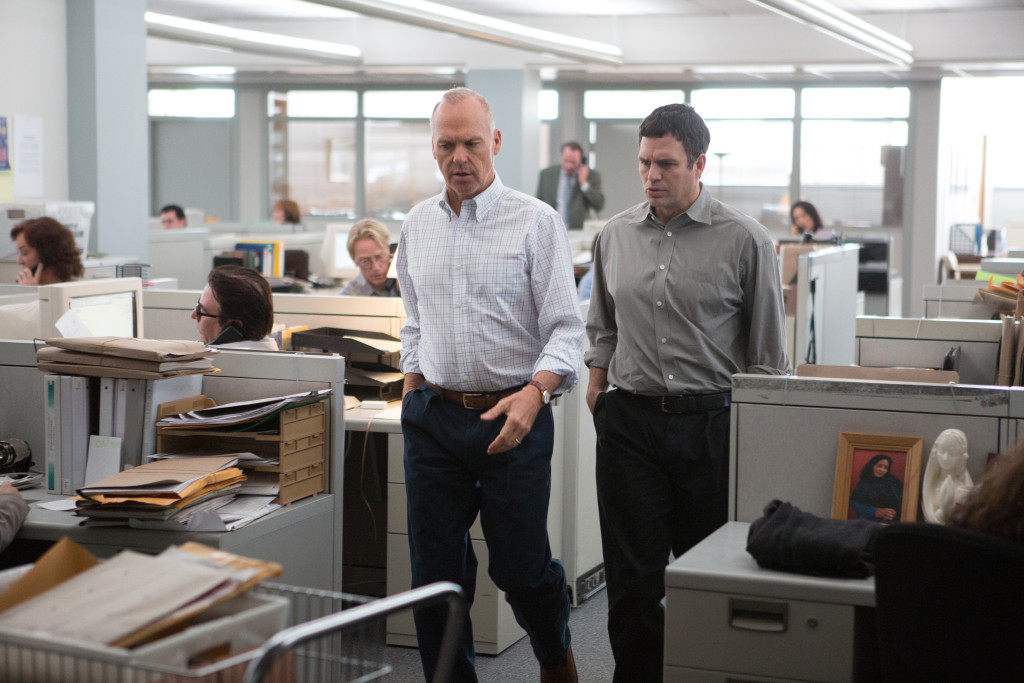Spotlight Review
 There’s a moment in the first episode of season five of The Wire – which stars Spotlight director Tom McCarthy as a reporter – in which the older reporters at the Baltimore Sun school a fresh faced journalist about the importance of minor details. They explain to her an error that she made in stating in an article that 120 people were evacuated. But describing people as being evacuated means that they all got enemas. What she meant to say was that the building was evacuated. As one old timer quips, “At the Baltimore Sun, God still resides in the details.”
There’s a moment in the first episode of season five of The Wire – which stars Spotlight director Tom McCarthy as a reporter – in which the older reporters at the Baltimore Sun school a fresh faced journalist about the importance of minor details. They explain to her an error that she made in stating in an article that 120 people were evacuated. But describing people as being evacuated means that they all got enemas. What she meant to say was that the building was evacuated. As one old timer quips, “At the Baltimore Sun, God still resides in the details.”
McCarthy has taken this old school journalistic approach with his latest film, Spotlight, which is a measured and meticulously detailed look at the reporting of the institutionalised concealment of child abuse within the Catholic Church by the Boston Globe’s Spotlight team. Spotlight is in some ways something of a process movie, with seemingly every element of the investigation by the Spotlight reporters shown in precise detail. It is their tireless pursuit of the truth and attention to intricate analogue investigations – a dark basement filled with telephone directory size books that must be searched by hand plays a key role – that builds a complete picture that turns a story previously buried in the metro section of the paper into one of the most important journalistic endeavours of the past twenty years. It is a very serious reminder of the importance of intelligent and carefully researched journalism.
McCarthy directs Spotlight in a suitably unshowy manner, with many long unfussy tracking shots, for instance, of the Spotlight team walking and talking and pounding the pavement in search of people who will go on record regarding the Church’s attempts to cover up child abuse and protect the abusers rather than the victims. But whilst there may be no intense moments of emotion, with music swelling and visual histrionics – the kinds of things that people often mistake for impressive direction – there are so many moments in which McCarthy, working with cinematographer Masanobu Takayanagi, finds ways to visually communicate something important without the need for exposition.
Children playing, a school bus intersecting the frame or a church slowing coming into view do all the work, for instance, in explaining the circumstances in which this story is developing and the importance of it to Boston as a city. There’s also a great deal of nuance in the performances that frequently helps add texture to the story. The way in which Mark Ruffalo‘s Rezendes takes a chair or Stanley Tucci‘s Garabedian looks up as a pair of Boston cops walk past reveals important information about their characters and in the latter case affects our understanding of the narrative. Ruffalo and Tucci are part of a wider cast in Spotlight that represents a fine ensemble, without a weak link in the chain. No one actor stands out though, each playing their crucial part to make up a satisfying whole.
There’s a lack of sensationalism and a quiet, meticulous formal brilliance to Spotlight that really does mark it as a film worthy of high praise. McCarthy directs with skill and such a fine attention to every scene and choice, no matter how minor, that it would be easy to overlook Spotlight‘s brilliance due to its lack of grand, attention grabbing moments. But, as the experienced journalists at the Baltimore Globe pointed out in The Wire, “God still resides in the details’.